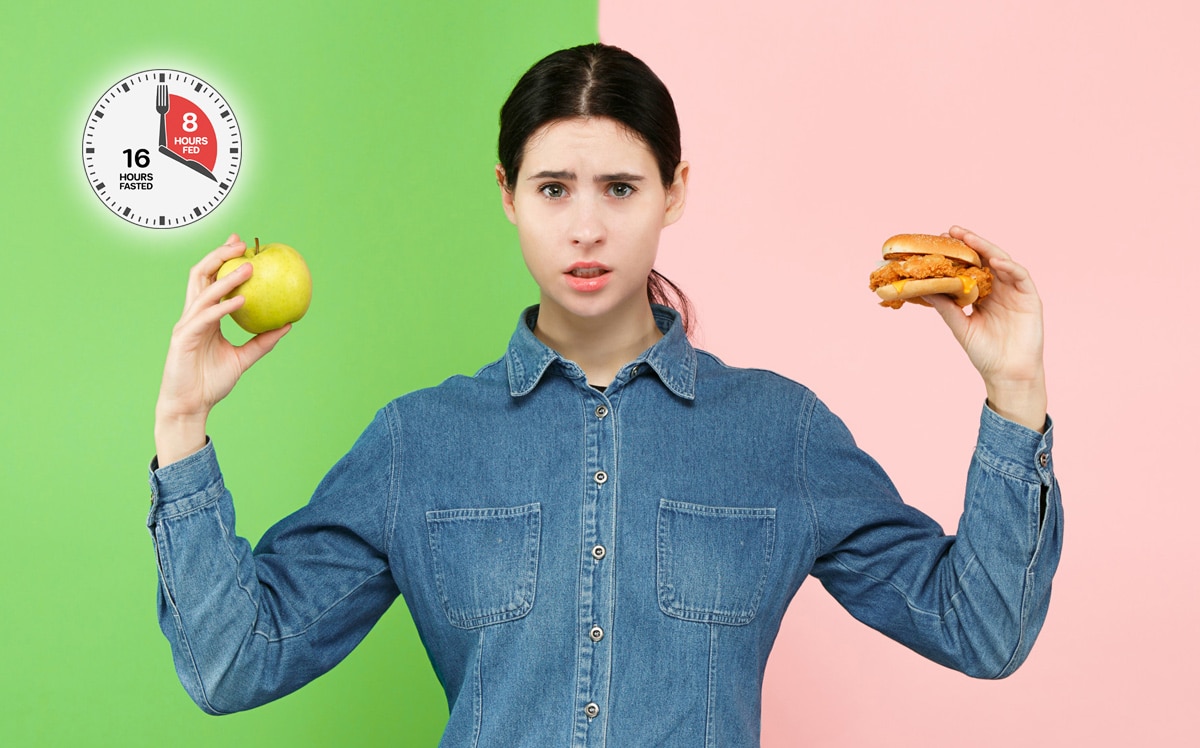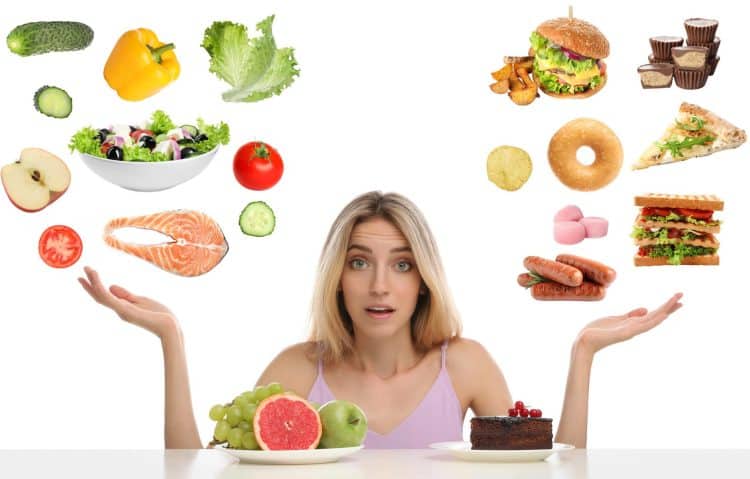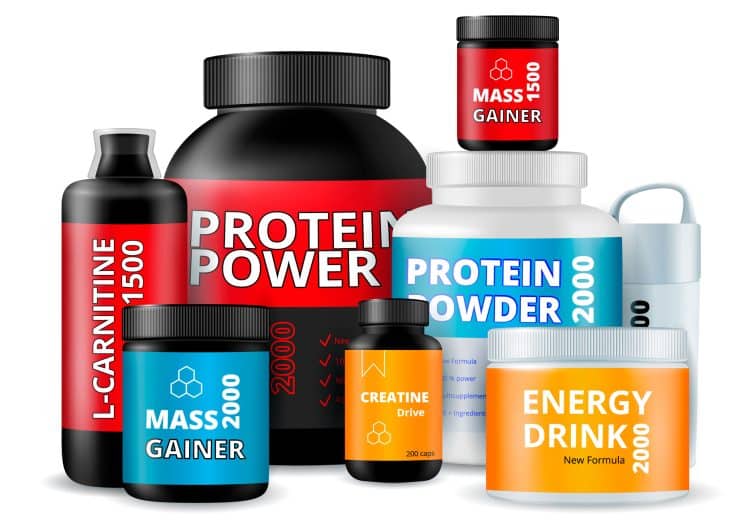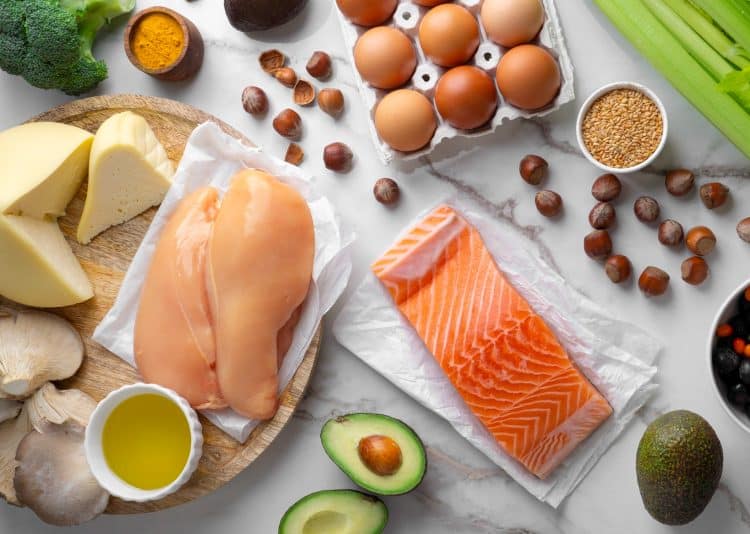Intermittent Fasting (IF) is an age-old fasting plan known for its overall health benefits. Its simple and flexible nature makes it convenient for most people. Intermittent fasting involves alternating between voluntary fasting and eating windows. You can select your eating and fasting windows to suit your lifestyle and preferences. While there are many IF patterns to choose from, some of the most popular are the 16:8, 14:10, 12:12, and 20:4 (Warrior Diet) methods, periodic fasting such as the weekly 24-hour fast, alternate day fasting, fasting twice a week, and many others. [1]
Speaking of the eating and fasting periods in your IF schedule, it is important to note that you must avoid consuming calories during the fasting period. Consuming calories will break your fast and disrupt your progress. However, experts suggest keeping yourself hydrated through the fasting period. Hence, you can drink plain water to maintain your body’s electrolyte balance during fasting hours.
Now that you know how to plan your fasting period, the next big concern is your feeding window. IF does not prescribe or restrict you to a specific meal plan. Does it mean you can binge on anything during the eating period? The answer is not a definite no, as IF offers the flexibility to choose your diet. However, you still need to watch what you eat for best results. Gorging junk food during the feeding window may affect your weight loss and overall health.
Will This Break Your Fast?
Find out if coffee, tea, sweeteners, and other drinks break your fast based on your specific fasting goals.
Check What Breaks My Fast →Junk foods contain high levels of fat, salt, and sugar and have little or no nutrients. They are usually high in trans fats and low in fiber, vitamins, and minerals. Aside from interfering with your IF goals, such foods can lead to long-term health complications such as weight gain, cardiovascular problems, and diabetes.
How Does Your Diet Play a Role in Your Intermittent Fasting Goals
Are you still wondering why and how your diet will impact your expected intermittent fasting outcomes? If so, here’s what you need to know.
Intermittent Fasting involves limiting calorie consumption to specific hours in a day. However, IF doesn’t prescribe a diet for your eating window. But have you ever wondered why some people lose weight faster than others? While there could be many reasons why some people can achieve their weight loss goals more quickly than others, diet is one of the significant reasons. Your chosen diet can greatly affect your fasting plan’s efficacy.
Studies indicate that caloric limitations and time restrictions (as in the case of IF) may go hand-in-hand in improving metabolic health outcomes. [2] Hence, keeping a check on your calorie intake during intermittent fasting can help improve your overall metabolic health, thereby enabling weight loss, lowering insulin resistance, and other health benefits. [3][4]
So, if you aim to lose weight via IF, paying attention to what you eat during the eating window may become indispensable. Eating massive amounts of calories during the feeding period can be detrimental to your weight loss ambitions.
If you aim to lose weight with IF, not watching your calories or food sources can be a costly mistake. You must plan your meals while intermittent fasting for the best results.
Your meals should include a variety of nutrient-rich foods and help you achieve your daily macro and micronutrient targets. Eating a balanced diet void of unwanted calories can help maintain a healthy weight.
You must practice mindful eating during intermittent fasting and eat foods that support your health and wellness goals. It is equally important to get the required calories during the eating phase to maintain a good metabolism, as that plays a vital role in weight loss. However, the quality of calories is just as important, and that’s where people often go wrong.
Common Mistakes Made by People When Choosing What to Eat During Intermittent Fasting
Although intermittent fasting doesn’t bar you from eating any foods, consuming surplus calories from unhealthy sources can derail your weight loss journey.
While eating satiating meals is important during the feeding window, overeating is not recommended. Overeating in anticipation of hunger is common for IF beginners. Starting with a shorter fasting window may prevent you from overeating or eating the wrong food due to cravings. [5]
Cravings can lead to indulgence in unhealthy food. This could range from ice creams to pasta, deep-fried food items, and other calorie-dense foods packed with sugar and refined carbs. Such foods may leave you feeling bloated and hungrier. Hence, you must choose your food wisely.
Foods to Limit and Avoid During Intermittent Fasting
While there’s an exhaustive list of healthy foods that you should include in your diet when following an intermittent fasting regimen, there are foods you should keep off your plate.
Food that you could limit during your IF feeding window is calorie-dense foods, foods that contain high amounts of refined sugars and unhealthy saturated fats, or excessive sodium content. Such foods may not provide your body with adequate nutrients and can also make you hungrier by increasing your cravings for junk food. Hence, it is best to avoid compensatory overeating during the eating window, especially by consuming high-calorie foods such as sweetened baked goodies, pizzas, calorie-dense beverages, sugary cereals, and granola. [6]
Here’s a list of foods and beverages you should avoid during IF.
- Cookies
- Candies
- Pastries and cakes
- Sugary cereals that are low in dietary fiber
- Deep-fried foods like French fries, chips, doughnuts, and fried meat.
- Processed foods like cheese
- Sweetened beverages, including tea, coffee, milkshakes
- Energy drinks and caffeinated beverages
Sweetened food items are processed and devoid of nutrients. Also, sugary foods metabolize faster, leaving you feeling hungry quickly. Eating such food during your small eating window sets you up for failure. Prioritizing food sources is crucial for optimizing IF benefits.
Consuming calorie-laden beverages is a common mistake people make while intermittent fasting. While keeping yourself hydrated is important, consuming sugary drinks can spike sugar levels. Here are a few beverages you should keep off your IF menu, especially if you don’t wish to break your fast:
Creamed Coffee and Milk Tea
Ingredients such as sugar and milk or even artificial sweeteners can impact your blood sugar levels and metabolism and break your fast.
Coconut Water
Although coconut water is hydrating, it contains carbohydrates that can end your fast.
Fruit and Vegetable Juices
Fruits and vegetables contain high amounts of fructose, and consuming them during your fasting window may not be suitable. However, you may add unsweetened, freshly squeezed juices to your feeding window, as fresh fruits and vegetable juices can be highly nutritious.
Energy Drinks
Most energy drinks contain calories and are often topped with artificial sweeteners. Consuming them in the fasting window will break your fast.
Protein Supplements and Gummy Multivitamins
Protein and amino acid supplements can break your fast. The popularity of multivitamin supplements has increased in recent years. Also available in the gummy form, multivitamins contain protein, glucose, and fatty acids, which could interfere with your fasting window and must be avoided.
Foods You Should Include in Your IF Diet Plan
The good thing about IF is that it allows a range of foods to be included in your diet. You must ensure a balanced meal plan that includes lean protein, vegetables, fruits, healthy carbohydrates, and fats. Healthy eating is indispensable for maintaining a healthy weight. [7]
Proteins
Proteins can keep you feeling full for longer. Moreover, an essential nutrient for cell repair and muscle building, protein is integral to your diet. So, if you want to build and maintain your muscles during IF, you should make lean protein sources a basic diet feature.
Here are the best protein sources to include in your IF diet plan:
- Chicken breast
- Legumes
- Fish
- Tofu and tempeh
- Greek yogurt
- Eggs
Fish and seafood are not only a rich source of protein but also contain calcium, vitamin D, and healthy fats.
In addition to the above foods, you can add whole grains and beans to your IF diet plan and cut down on refined grains such as white flour. So, for our vegan friends, there is no dearth of options as you can get your protein from beans, chickpeas, peas, black beans, and lentils in your eating window. A high-protein diet keeps you feeling full for longer, which can help you get through a big chunk of your fasting window. You can also add various nuts and seeds to your IF eating plan.
Find your daily protein requirements here.
Vitamins and Minerals
For your daily dose of vitamins, minerals, phytonutrients, and fiber, you must eat your greens and fruits as a part of your IF diet. Loaded with minerals, vitamins, and other nutrients, fruits and vegetables can help lower cholesterol levels, regulate blood sugar levels, and maintain bowel health. And the bonus is that this food group is low in calories.
Some healthy fruits you can add to your IF diet include apples, apricots, blueberries, cherries, peaches, watermelon, plums, pears, and blueberries. Similarly, vegetables such as cabbage, kale, collard greens, spinach, arugula, and chard can enrich your IF diet plan.
Healthy Fats
Not all fats are bad for your body. Some fats are crucial for energy generation, hormone production, insulation, and many other body functions. They are also essential for metabolizing fat-soluble nutrients in the body. Some good fat sources you can add to your IF diet include olive oil, coconut oil, nuts, seeds, and avocado oil. However, you must use fats in moderation.
It would also be good to set some rules and avoid soda, sugary juices, and sweetened tea or coffee as much as possible during the feeding window. Although you could consume unsweetened green tea, herbal tea, or black coffee in moderation during the IF fasting period, avoid adding any creamers, artificial sweeteners, or sugar, as it will add to your calorie intake and eventually break your fast.
Probiotics and Other Fermented Foods
Intermittent fasting can improve gut health and boost gut microbiota. While there are no strict rules about what you can eat during your IF eating window, probiotics should be a top priority.
Some studies among prediabetics reveal that the use of prebiotics during intermittent fasting can prove beneficial in improving glucose tolerance. Such studies also show additional psychological benefits derived from probiotic supplementation consumed during IF with the objective of weight loss and improved glycemic levels in prediabetics. [8]
Probiotics are live organisms that can have health benefits as these are similar to bacteria found in your gut microbiome. Probiotics can be found in yogurt, aged cheese, kimchi, kombucha, kefir, sauerkraut, and many other fermented foods and dietary supplements. These can increase the diversity of good bacteria in your gut, thereby enhancing your gut health.
You must avoid processed foods during IF, as too much added sugar, fats, salts, and artificial ingredients can often cause severe health conditions like heart disease and type 2 diabetes. Moreover, it isn’t great for your gut health. Ultra-processed foods such as sweetened sodas, cookies, sugary breakfast cereals, candies, refined flour pizzas, and other such food items don’t contain much fiber or nutrients to optimize your gut health.
Tips to Make Better Food Choices During Intermittent Fasting
Prolonged fasting can often lead to cravings, but you must check what you choose to include in your diet. Here are a few handy tips to help you stay on track and optimize fasting:
Stay Hydrated
Whether in the fasting or feeding window, drink plenty of water to keep yourself well-hydrated throughout the day. Besides water, you can consume calorie-free and unsweetened beverages such as herbal teas. This can replenish the lost electrolytes, sodium, and other essential minerals your body requires.
Make Every Calorie Count, Include Fiber-Rich Foods
You must make the most of your eating windows and ensure you’re meeting your daily macro and micronutrient targets. Eat nutrient-dense foods rich in fiber, protein, and healthy fats. You can add some food items: lentils, eggs, fish, nuts, fruits and green vegetables, unprocessed meats, etc.
Meal Preparation
There can be no better alternative to fresh, home-cooked meals. During intermittent fasting, you will eat during a specific time, so make sure you eat the most nutrition-rich foods. When preparing meals, use a variety of cooking methods for different food items, as every method has its benefits — for example, poaching, fermenting, steaming, grilling, and roasting. Avoid deep frying. Instead, you can air fry or stir fry your food in minimum oil.
You can use herbs and spices to season your meals without adding too many calories. Also, flavorful foods can promote satiety.
Be Cautious While Eating Out
Outside food, be it street food or that served at a fine dining restaurant, is most likely laced with unhealthy fats that could add to your overall calorie intake. Moreover, they could be packed with refined carbs that are low in fiber.
If avoiding outside food is impossible, you can at least make the right choices. Try picking items that contain whole grains like quinoa, barley, oats, local millets, vegetables, fruit salads, etc. Avoid fancy dressings to minimize empty calorie content.
Avoid thick curry recipes with more oil, butter, full cream, and high amounts of sodium and sugar. Simultaneously, skip beverages that contain added sugar. Avoid fizzy carbonated drinks. Instead, consider drinking water or unsweetened herbal teas and avoid alcohol.
How to Balance Cheat Meals
Healthy meals are integral to keeping your body in shape, achieving weight loss goals faster, and improving overall fitness. However, cravings aren’t abnormal, nor are cheat days a sin. Adopt the proper techniques to enjoy a guilt-free cheat day.
When done right, a cheat meal can be a viable strategy in helping you stick to your IF routine. For this, you must consider your cheat meals a part of your IF plan. This will help you determine how often you should indulge in cheat meals.
When eating a cheat meal, opt for low-sugar options to keep the insulin levels in check. Try recipes featuring vegetables, nuts, proteins, and whole grains. With growing health awareness, even restaurants have healthier versions of cheat foods. So, if you are eating out, you can choose low-calorie foods as your cheat meals or cook up your unique recipe with healthier options.
Your cheat meals could be packed with sodium and sugar. Hence, you need to flush those toxins out of your system. Drink lots of water to filter out the toxins.
Schedule your cheat meals on your workout days. However, if you are trying to lose weight, it is recommended to stick to fewer cheat meals.
Risks Associated with Intermittent Fasting
Although one of the better-acclaimed fasting methods, intermittent fasting isn’t devoid of risks as some people may experience side effects from fasting for long hours. These could include:
- Hunger pangs and cravings
- Constipation
- Irritability
- Headaches
- Bad breath (Halitosis)
- Mood swings
Fasting may not be suitable for many people, including pregnant or lactating women. Also, those with a history of eating disorders or medical conditions should abstain from IF. It would be best to check with your physician before beginning intermittent fasting.
FAQ’s
Can I eat junk while intermittent fasting?
Although there is no specific restriction on what you can consume in your IF eating window, you shouldn’t consume food saturated with high-fat or refined sugars. Also, you must avoid processed foods while practicing IF. Plan your meal to keep track of the calories.
Can I eat carbohydrates while intermittent fasting?
You can always include healthy carbs in your IF eating window. Carbohydrates are one of the three macronutrients and provide energy to our body. However, choose the right carbs and avoid refined carbs. Healthy sources of carbs include whole grains, fruits, vegetables, legumes, etc.
Are fruits allowed in an IF eating plan?
You can include fruits in your eating window as they are a rich source of vitamins, minerals, fiber, and many other phytonutrients. However, check your portion size to avoid overeating.
Can I snack during intermittent fasting?
Yes, you can snack during IF but consume them within the eating window. Also, consider eating healthy snacks and avoid deep-fried, sugary, or junk food, low in nutritional value. Eating healthier snacks can be satiating and prevent cravings during fasting.
Wrapping Up
Although IF can help you achieve your health goals, overeating and consuming high-calorie or junk food while fasting can hamper its benefits.
The idea is to eat nutrient-dense food that not only satiates your hunger during the eating window but also supports your fasting period. Hence, consider food quality when planning your IF diet and eliminate food items that keep you from achieving your weight loss goals.
You can consult a nutritionist if you need help planning your IF meals. That way, you will minimize the chances of going wrong on food options and save yourself a lot of time, money, and frustration in the long run.
References
Fitness Volt is committed to providing our readers with science-based information. We use only credible and peer-reviewed sources to support the information we share in our articles.
- Research on intermittent fasting shows health benefits. (2020, February 27). National Institute on Aging.
- Soliman, G. A. (2022, October 28). Intermittent fasting and time-restricted eating role in dietary interventions and precision nutrition. PubMed Central (PMC).
- Vasim, I., Majeed, C. N., & DeBoer, M. D. (2022, January 31). Intermittent Fasting and Metabolic Health. PubMed Central (PMC).
- Kong, D. X., Xiao, Y., Zhang, Z. X., & Liu, Y. B. (n.d.). Study on the Correlation between Metabolism, Insulin Sensitivity and progressive weight loss change in Type-2 Diabetes. PubMed Central (PMC).
- Elsworth, R. L., Monge, A., Perry, R., Hinton, E. C., Flynn, A. N., Whitmarsh, A., Hamilton-Shield, J. P., Lawrence, N. S., & Brunstrom, J. M. (2023, June 1). The Effect of Intermittent Fasting on Appetite: A Systematic Review and Meta-Analysis. PubMed Central (PMC)
- Collier, R. (n.d.). Intermittent fasting: the science of going without. PubMed Central (PMC).
- C. (2023, June 7). Healthy Eating for a Healthy Weight. Centers for Disease Control and Prevention.
Tip: If you're signed in to Google, tap Follow.














